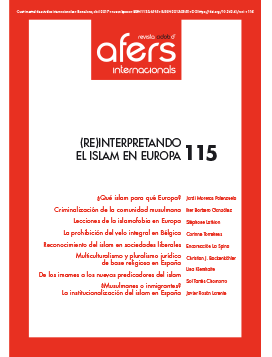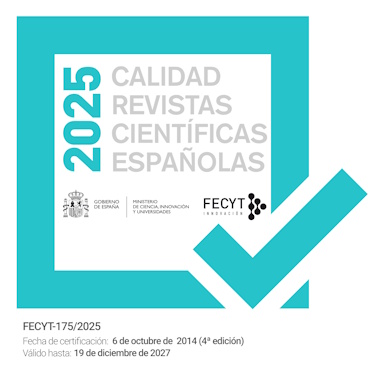Criminalisation of the Muslim community and the fight for the presumption of innocence
Keywords:
migration, acts of citizenship, neo-Orientalism, anti-terrorist legislation, BarcelonaAbstract
Revista CIDOB d’Afers Internacionals, nº 115
Quadrimestral (January - September 2017)
ISSN:1133-6595 | E-ISSN:2013-035X
DOI: https://doi.org/10.24241/rcai.2017.115.1.39
In parallel to the strategy of neo-Orientalising the Muslim community in Europe, acts of resistance emerge to condemn it. This article considers neo-Orientalisation not only as a strategy for exoticising and/or undermining the community, it demonstrates that it may be understood as an “agonistic Government strategy”. To this end, the paper presents the case of the “Raval 11” and bases its analysis on the interpretation of the resistance by family and activists to the arrests of 11 Pakistanis and Indians on charges of terrorism in Barcelona in 2008 as “acts of citizenship”. New political subjects were engaged: women, young people and children burst onto the scene demanding both freedom and the presumption of innocence for their relatives and dignity for the wider Muslim and migrant community criminalised by the dominant political and media discourses.
>> The full text articles of this issue are available only in Spanish language
References
Asens, Jaume y Pisarello, Gerardo. «Discutir sobre el civismo un año después». El País (1 de febrero de 2007) (en línea) http://elpais.com/diario/2007/02/01/catalunya/1170295646_850215.html
Balibar, Etienne. We, the people of Europe? Reflections on transnational citizenship. Nueva Jersey: Princeton University Press, 2009.
Barbero, Iker «El control selectivo de las fronteras y la transnacionalización de sus resistencias». Arbor: Ciencia, pensamiento y cultura, vol. 186, n.º 744 (2010), p. 689-703.
Barbero, Iker. «Orientalising citizenship: the legitimation of immigration regimes in the European Union». Citizenship studies, vol. 16, n.º 5-6 (2012), p. 751-768.
Barbero, Iker. «Citizenship, identity and otherness: the orientalisation of immigrants in the contemporary Spanish legal regime». International Journal of Law in Context, vol. 12, n.º 03 (2016), p. 361-376.
Bedoya, María Helena. «Mujer extranjera: una doble exclusión. Influencia de la Ley de Extranjería sobre las mujeres inmigrante». Papers: revista de sociología, vol. 60 (2000), p. 241-256.
Beltrán Antolín, Joaquín y Sáiz López, Amelia. «La comunidad pakistaní en España». Anuario Asia-Pacífico 2007. Barcelona: Real Instituto Elcano, Fundación CIDOB, 2008, p. 207-216.
Bigo, Didier. «Sécurité, immigration et contrôle social. L’archipel des pólices». Le Monde Diplomatique, (octubre de 1996) (en línea) http://www.mondediplomatique.fr/1996/10/BIGO/5825
Bigo, Didier y Tsoukala Anastassia (eds). Terror, Insecurity and Liberty: Illiberal Practices of Liberal Regimes after 9/11. Abingdon: Routledge, 2008.
Cestau, María José. «La Ley de Extranjería y su repercusión en la mujer inmigrantes. El caso pakistaní», en: Goicoechea Gaona, María Ángeles y Clavo Sebastián, María Josefina (eds.). Mujeres que miran a mujeres: la comunidad pakistaní. Logroño: Universidad de La Rioja, 2012, p. 63-76.
Colectivo Vírico. «Introducción. La letra pequeña», en: VV.AA. Rastros de Dixan. Islamofobia y construcción del enemigo en la era post 11-S. Barcelona: Virus editorial, 2009, p 8-9.
Davis, Douglas. «No surrender. Douglas Davis talks to José MarÃa Aznar in Madrid about terrorism, multiculturalism and the Atlantic alliance». The spectator (16 de julio de 2005) (en línea) https://www.spectator.co.uk/2005/07/no-surrender/
De Lucas, Javier. «Discursos de la invisible. Construir la presencia de los inmigrantes», en: Alemán, Jorge (coord.) Los otros entre nosotros: alteridad e inmigración. Madrid: Círculo de Bellas Artes, 2003, p. 213-232
Delgado, Manuel. La ciudad mentirosa: fraude y miseria del «modelo Barcelona». Madrid: Los libros de la Catarata, 2007.
Fernández, Cristina; Manavella, Alejandra y Ortuño, José María. The Effects of Exceptional Legislation on Criminalization of Immigrants and People Suspected of Terrorism. Universitat de Barcelona, Observatori del Sistema Penal i els Drets Humans, Challenge Report 9 (2009).
Fitzpatrick, Peter. The Mythology of Modern Law. Londres y Nueva York: Routledge, 1992.
Fukuyama, Francis. «Identity, Immigration, and Liberal Democracy». Journal of Democracy, vol. 17, n.º 12 (2006), p. 5-20.
García, Ter y Prat, Joan. «Las cloacas de la lucha “antiyihadista”». Diagonal/ La Directa (30 de diciembre de 2015) (en línea) https://www.diagonalperiodico.net/libertades/28793-cloacas-la-lucha-antiyihadista.html
Gregorio, Carmen. «Mujeres inmigrantes colonizando sus cuerpos mediante fronteras procreativas, étnico-culturales, sexuales y reproductivas». Viento sur, n.º 104 (2009), p. 42-54.
Guittet, Emmanuel-Pierre. «European Political Identity and Democratic Solidarity After 9/11: The Spanish Case». Alternatives. Global, Local, Political, vol. 29, n.º 4 (agosto-octubre de 2004), p. 441-464.
Hunt, Krista y Rygiel, Kim (eds.). (En)Gendering the war on terror: war stories and camouflaged politics. Londres: Ashgate, 2006.
Huntington, Samuel. The Clash of Civilizations and the Remaking of World Order. Nueva York: Simon & Schuster, 1998.
Irujo, José María. «EE UU considera Cataluña el «mayor centro mediterráneo del yihadismo»». El País (10 de diciembre de 2010) (en línea) http://elpais.com/elpais/2010/12/10/actualidad/1291972643_850215.html
Isin, Engin. Being Political: Genealogies of Citizenship. Minessota: University of Minnesota Press, 2002.
Isin, Engin. «Theorizing acts of citizenship», en: Isin, Engin y Nielsen, Greg (eds.). Acts of Citizenship. Londres: Palgrave Macmillan, 2008, p. 15-43.
Isin, Engin. «Citizenship in flux: the figure of the activist citizen». Subjectivity, vol. 29, n.º 1 (2009), p. 367-388.
Majid, Anouar. We Are All Moors: Ending Centuries of Crusades against Muslims and Other Minorities. Minneapolis, MN: University of Minnesota Press. 2009.
Martín, Miguel. «“A Asim, el deixaven fer i desfer amb el seu negoci de venedor de papers i d’estafador”. Entrevista a Braulio García Jaén, periodista que ha investigat la identitat d’F1». Directa (10 de junio de 2014) (en línea) https://directa.cat/asim-deixaven-fer-desfer-amb-seu-negoci-de-venedor-de-papersdestafador
Martín Corrales, Eloy. «El moro, decano de los enemigos exteriores de España: una larga enemistad (siglos viii-xxi)», en: Nuñez Seixas, Xosé y Sevillano Calero, Francisco (eds.). Los enemigos de España. Imagen del otro, conflictos bélicos y disputas nacionales (siglos xvi-xx). Madrid: Centro de Estudios Políticos y Constitucionales, 2010, p.165-182.
Mitsilegas, Valsamis. The criminalisation of migration in Europe: challenges for human rights and the rule of law. Londres: Springer, 2014.
Moreras, Jordi. Musulmanes en Barcelona: espacios y dinámicas comunitarias. Barcelona: CIDOB, 1999.
Moreras, Jordi «¿Ravalistán? Islam y configuración comunitaria entre los paquistaníes en Barcelona». Revista CIDOB d’Afers Internacionals, n.º 68 (2005), p. 119-132.
Nyers, Peter y Rygiel, Kim. Citizenship, Migrant Activism and the Politics of Movement. Londres: Routledge, 2012.
Rygiel, Kim. Globalizing citizenship. Vancouver: UBC Press, 2010.
Salellas, Benet. «El Derecho contra la Justicia», en: Prado, Abdennur; Martínez, Albert; López Bargados, Alberto; Salellas Vilar, Benet; Fernàndez, David y Rivera Beiras, Iñaki. Rastros de Dixan. Islamofobia y construcción del enemigo en la era post 11-S. Barcelona: Virus editorial, 2009, p. 65-85
Sartori Giovanni. La sociedad multiétnica. Pluralismo, multiculturalismo y extranjeros. Madrid: Taurus, 2001.
Silveira, Héctor. «Barcelona y el fomento de la convivencia a través de la represión del Espacio público», en: Bergalli, Roberto y Rivera Beiras, Iñaki (eds.). Emergencias urbanas. Barcelona: Anthropos, 2006, p. 239-260.
Yatero, Carlos. «Un juicio basado sólo en los “indicios” de un confidente». Diagonal (15 de noviembre de 2009) (en línea) https://www.diagonalperiodico.net/juicio-basado-solo-indicios-confidente.html
VV.AA. Rastros de Dixan. Islamofobia y construcción del enemigo en la era post 11-S. Barcelona: Virus editorial, 2009.
Walsh, Declan. «“Terrorist” group who turned out to be the president›s men». The Guardian (9 de febrero de 2008) (en línea) https://www.theguardian.com/uk/2008/feb/09/pakistan.terrorism
Zapata-Barrero, Ricard y de Witte, Nynke. «Muslims in Spain: Blurring Past and Present Moors», en: Triandafyllidou, Anna (dir.). Muslims in 21st century Europe: Structural and Cultural Perspectives. Londres: Routledge, 2010, p. 181-198.
Zine, Jazmine. «Between orientalism and fundamentalism: The politics of Muslim women’s feminist engagement». Muslim World Journal of Human Rights, vol. 3, n.º 1 (2006), p. 27-49.













